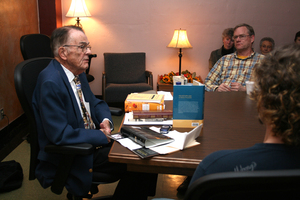Dorset Graves tells about Shakespeare fascination

Dr. Dorset Graves’ lifelong fascination with William Shakespeare’s work continued last week when the retired Chadron State College language arts professor talked at length about the classic playwright during a presentation in the Reta King Library.
Graves’ discussion was this fall’s final installment for the library’s feature that is named in his honor, the Dorset Graves Lecture Series.
Much of the retired professor’s presentation was intended to bring people “up to speed” about recent commentary about Shakespeare, who died on his birthday almost 400 years ago. Graves also gave insight about how he became the Shakespeare enthusiast that he is today.
Graves, 83, said his first encounter with Shakespeare occurred when he stumbled across a battered copy of Shakespeare’s complete works while rummaging through the attic of his grandmother’s two-story home in east-central Missouri. He was 10 or 11 years old at the time.
Despite the fact that the covers had been torn from the piece and the compilation had no introductions, footnotes or glossary of unfamiliar terms, Graves took a liking to it and found himself working through the pages of “Romeo and Juliet.” The Elizabethan narrative was difficult, especially for a boy his age, to decipher, but he was familiar with the story because Hollywood had recently brought it to the big screen.
“I wasn’t a child prodigy. I didn’t pick up on it right away. It took me quite a while, but I was determined,” he said.
Soon, the budding literature professor approached his middle school’s principal and proposed to lead his seventh-grade classmates in a production of “Romeo and Juliet,” offering to “rewrite it so everyone would understand.”
“Mr. McBride was horrified,” Graves said. “He said, ‘No, no, no. It’s not the kind of play young teens should read, much less perform.’ Now, of course, R and J is practically the only play by Shakespeare in ninth and 10th grades throughout the U.S.”
Despite the setback, Graves’ love of Shakespeare continued to flourish. Before long, he memorized three speeches from classic works: Hamlet’s “to be or not to be,” Portia’s remarks about the “quality of mercy” from the “Merchant of Venice” and the words Mark Antony spoke over the body of Caeser.
“Someone, I forget who, managed to, or I should say, encouraged me to write out three speeches from my copy of Shakespeare and memorize them, the better to amuse visiting relatives. And I was just enough of an insipient hand to do just that,” he said.
Graves’ fascination with Shakespeare has followed him many places. While serving in the Battle of Okinawa during World War II, Graves said he was reading Shakespeare’s plays atop a troop transport ship, with “battle gear in hand, filling the many boring hours on duty.”
“I got tired of seeing those Japanese planes go over and go down. It just became boring after a while,” he said.
Graves taught English at CSC for 32 years, where he became recognized as an expert on Shakespeare and for spending countless hours perusing books at the library.
During his discussion, Graves was surrounded by copies of literature about Shakespeare and referred to more than a half dozen pieces written by the playwright’s critics. He noted that an almost immeasurable number of such volumes is available.
He said 46 shelves of books are dedicated to the classic author in CSC’s library, but noted CSC’s collection is “just a fraction of a fraction of a fraction of all that has been written.” While pointing out the value of the critical work, Graves said much has been produced that is “unscholarly, frivolous or meant to be understood only by a fellow theorist.”
Graves said he doubts that all the works dedicated to Shakespeare have been assembled in one place, except possibly the Folger Shakespeare Library in Washington, D.C.
The Graves Lecture Series will resume in the spring. Although the schedule of speakers has not been finalized, organizers are encouraging people to begin reading in preparation for the lecture series’ book club discussion.
“Star Thrower,” a compilation of the late Loren C. Eiseley’s favorite writings, will be the topic of the session. Eiseley, a native Nebraskan who would have recently turned 100, was known for his meditations of the natural world. He died in 1977.
CSC faculty member Ann Buchmann will lead the discussion Tuesday, Feb. 19, 2008, at 7 p.m. in the library. Ann Krejci, another CSC faculty member who is one of the club’s organizers, said anyone who is interested in joining should read the book and be ready to participate in the discussion. It is open to the public free of charge.
Category: Campus News
